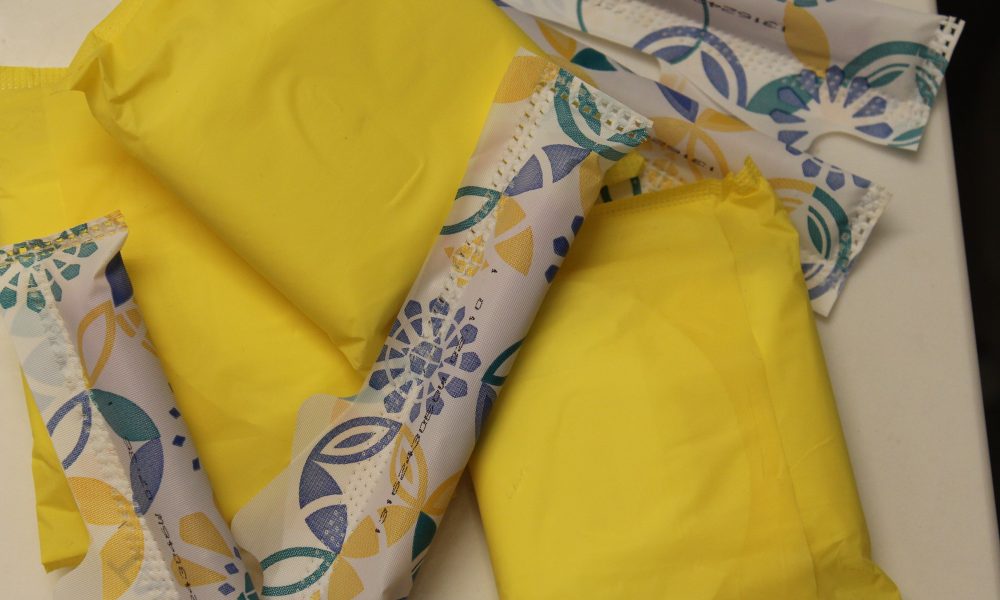Students are often suckers for a quick vending machine pick-me-up. Those buttons are seductive. B6. C105. D47. They produce instant gratification, scratching the itch of the moment.
The anticipation of watching, waiting, as what you want makes its way toward you. The fix is coming. You know the feeling. The mixed drink of joy and relief as the treat falls to the bottom of the machine.
Now, students can take their fiendish tendencies to the next level, all while maintaining their wallet. Three new vending machines have popped up on campus.
Rather than run of the mill snacks, these new vending machines have tampons and pads.
While Long Beach State offers free menstrual products in the Health Center and at University Student Union restrooms, the machines expand the amount of free resources and locations that services students who may need a plug. With improved accessibility, faculty hope to ease the stress of purchasing such supplies.
In addition to improving accessibility, the vending machines may mitigate period poverty, or the struggle to afford menstrual products. Statistically, Latinx and Black people, which make up 45.3% and 3.87% CSULB’s student demographic respectively, are most at-risk to be impacted by period poverty.
Many have been forced to find cheaper and less sane alternatives, such as sponges and other alternatives that may result in infections.
Payments are technically necessary to utilize these machines, but the costs are covered by the school. With the use of a valid Beach ID, sanitary pads and tampons are free.
According to Angela Conte, director of operations of Student Health Services, students’ cards are preloaded with $20 in funds which automatically renew each month.
“Anytime we can offer a free supply or a service to a student, I think it’s a wonderful thing, especially for a normal bodily function, where students don’t have a choice [to take care of it],” Conte said.
There are no restrictions as to how many products students can take, however the machines are wired to deduct $1 per product.
“The monthly amount is subject to change as we [faculty] see fit,” Conte said. “We are hopeful that students will take what they need and leave some for others that may need it.”
Funding is derived from California Assembly Bill 367, which as of Oct. 8, 2021, requires and encourages public schools grade 6-12, to CSU’s, community colleges and private universities “to stock an adequate supply of menstrual products, available and accessible, free of cost, at no fewer than one designated and accessible central location on each campus and to post a designated notice, as provided.”
In compliance with AB 367, posters that read “free menstrual products” are plastered among student bulletins, restrooms and hallways. The flyers also display scannable QR codes that show nearby machine locations. In total, three machines are scattered among both upper and lower campuses.
“We played around with different ideas and looked at certain areas on-campus that were high traffic areas versus areas that could provide more privacy, but then we [faculty] spoke about that and realized ‘Aren’t we trying to normalize this?’” Conte said.
The initiative, in part, was led by then-student Melena Gevorkian, co-founder CSULB’s chapter of Days for Girls, a menstrual-focused organization.
“I was concerned about how other students get access to these products [tampons and pads],” Gevorkian said.
After polling which buildings at CSULB offered period products, Gevorkian found that most buildings neglected to offer supplies consistently. In hopes of adding more dispensers throughout bathrooms, Gevorkian emailed Karyn Gunn, CSULB’s provost and senior vice president.
To kick start the process, Gevorkian worked closely alongside Conte to bring the student perspective to light.
“A lot of the students are low-income and first-generation students. And 60% of CSULB’s students are female,” Gevorkian said. “As a woman from a low-income family, to be in that group really helped me understand what they [students] need.”
After deciding to make the switch from bathroom only dispensers to vending machines, the idea to supply students consistently became more feasible and attainable.
That said, the work doesn’t stop there. Moving forward, Gevorkian hopes to see more awareness towards period poverty across all campuses.
In her words, “How can you ignore other things when you know that speaking up can change everything?”




